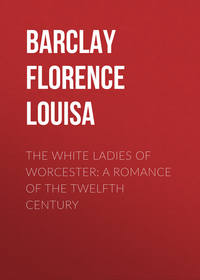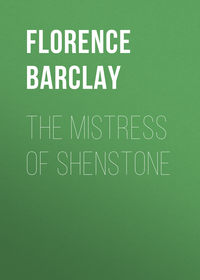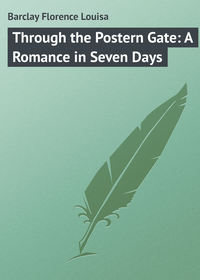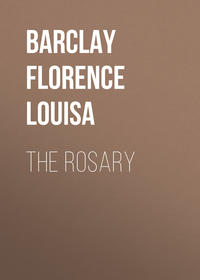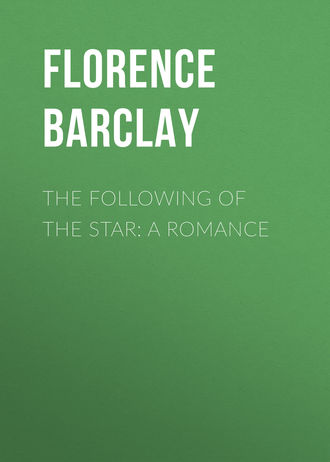 полная версия
полная версияThe Following of the Star: A Romance
Old Rodgers, deferential, yet very consciously paternal, his hands shaking with suppressed excitement, stood just within.
The housekeeper, expectant and alert, a bow of white satin ribbon in a prominent position in her cap, waited at the foot of the wide oak staircase.
The poodle, his tufts tied up with white ribbon, moved forward to greet his mistress; then advanced gravely into the portico, and inspected the empty motor. The poodle's heart was in the grave of Uncle Falcon. Weddings did not interest him. But the non-arrival of the bridegroom – who had once, with a lack of discrimination quite remarkable, even in a human being, mistaken him for Mrs. Marmaduke Vane – seemed a fact which required verification and investigation. The poodle returned, smiling, from his inspection of the empty interior of the motor. He had not paid much attention to the lengthy discussions in the servants' hall. But this much he knew. Old Rodgers had won his bet. The housekeeper would have to pay. This pleased the poodle, who resented the fact that the housekeeper had first trimmed her own cap, and then tied him up with the remnants; – adding to this obvious slight, a callous disregard of his known preference for green or crimson, where the colour of his bows was concerned.
As Diana entered the house, the old clock in the hall began to strike six; distant Westminster chimes sounded from an upper landing; an unseen cuckoo jerked out its note six times, then slammed its door; while the old clock, measured and sonorous, refusing to be either hurried or interrupted, slowly finished its six strokes.
Diana flung her cloak to Rodgers, and ordered tea in the library. Then, with a greeting to her housekeeper, she passed upstairs to her own room.
Mrs. David Rivers had come home.
CHAPTER XXIII
UNCLE FALCON WINS
Diana dined alone at the little round table in the big dining-room. She wore the white satin gown she had worn on the evening of Christmas-day, when David dined with her. The table decoration was lilies of the valley and Parma violets.
After dinner she went to the library, restless and lonely, yet glad to be alone; thankful she had postponed to the morrow, the return of Mrs. Marmaduke Vane.
On her writing-table, in a silver frame, stood the photograph of a special chum of hers, a man with whom she frequently played tennis in summer, and rode in winter; a good-looking fellow, with the appearance of an all round sportsman. His gay friendly eyes looked out at her with an air of easy comradeship, as she paused for a moment beside the table.
Diana was fond of this portrait of Ronald Ingram. It always stood on her writing-table. But, this evening, she suddenly took it up, and put it, face downwards, into a drawer. It had served to remind her that she possessed no photograph of David.
She moved over to the fireplace, tall and lovely, perfectly gowned, surrounded by all the luxury she loved – yet indescribably desolate.
She stood, wrapped in thought, warming her hands at the fire; then sank into Uncle Falcon's armchair, in which she had sat while she and David discussed their intended marriage.
Did she need a portrait of David?
Hardly. He was so vividly pictured in her mental vision.
She could see him in the pulpit of the little church at Brambledene – keen, eager, inspired; full of his subject; the dark eyes shining in his thin worn face.
She could see him in the vestry, seated on the high stool; boyish, shy; very much taken aback by her unexpected entry.
She could see him at the piano in the drawing-room, completely unconscious of his surroundings; enveloped in the music he himself was making.
She could see him seated opposite to her in the chair now empty, a look of strange detachment upon his tired face, as with infinite tact and gentleness he explained to her why he felt able, after all, to accede to her request; never departing from his own standpoint in the matter; yet making the thing as easy for her as possible.
She could see him in the church of St. Botolph, as he had stood that morning – was it really only that morning? – awaiting her. How strange had been the summons in his eyes, which drew her to his side. Ah, if there had but been love between them, how wonderful a memory would have been that look in David's eyes!
She could see him in the railway train – in boyishly high spirits, because nothing now stood between him and his departure for his belovèd sphere of work – seated opposite to her at the little table in the dining-car, rubbing the mist off the windows with his table napkin, and exclaiming over the beauties of the Hampshire hills and villages.
"Lord now lettest Thou Thy servant depart in peace." Poor David! She had certainly interfered with his peace of mind during the fortnight which had preceded their strange wedding. Well, he had departed in peace, and was undoubtedly gone "to be a light to lighten the Gentiles." And what a difference her money would make to the success of his work.
And then – she could see him as he bent down to her from the top of the gangway, his dark eyes gazing into hers, and said: "Good-bye, my wife." Surely, for the moment, it had meant something to David to call her his wife? She had never before seen quite such a look in any man's eyes. Was it fancy, or was there a hunger in them, which seemed to match the ache at her own breast? Sentimental fancy on her own part, no doubt; for had not David said of their wedding service: "It meant no more than we intended it should mean"?
How odious and impossible a state of things, if she – Diana Rivers – who had proposed this marriage, as a mere business transaction – should now be imagining into it sentiment which she had expressly stipulated should never enter therein. If David knew of it, would she not be forced to bow her head in shame, before his clear honest eyes?
No; certainly she needed no photograph of David!
She glanced at the portrait of Uncle Falcon hanging over the mantel-piece; then looked away at once. She was rather afraid of Uncle Falcon to-night. David had said she was to flaunt her victory in Uncle Falcon's face. She had replied that she might have done so, if he had been going to be with her. David had made no reply; but she had felt him shrink into himself. He had been too honest to express regret to his bride, that his engagements took him elsewhere on his wedding evening; and too kind, to show relief. When she had said: "David, I shall be quite alone at Riverscourt to-night," David had remarked: "Oh, look at the undulating line of those distant hills!"
A little gleam of amusement illumined the sad face, resting against the dark leather of Uncle Falcon's big chair; and, as the firelight played upon it, dimples peeped out. Had she looked up, she would have seen a corresponding twinkle in Uncle Falcon's amber eyes.
It really was rather funny. David and his table napkin! She knew she had not behaved quite well towards David, who was such a very faithful and very proper person. She felt she should always hate the distant line of undulating hills! If only he had tried to kiss her, and she could have boxed his ears, she would have enjoyed that journey better.
But, the next moment, a rush of tears drowned the gleam of fun in those sweet eyes. She had remembered David's face, as he said: "Good-bye, my wife." It seemed sacrilege even to think of boxing his ears! How ill he had looked, during those final minutes on the boat. It made it so terribly easy to picture David's face as it would look when he lay dying – dead.
Diana's tears fell silently. She, who scarcely ever wept, now found herself weeping without restraint, in a vague, helpless sort of way; and about nothing – that was the foolish part of it – she was crying about absolutely nothing!
"This will never do!" said Diana. "I am being as silly as an ordinary married woman. I must find something sensible to think about."
She rose from her chair, stretched her beautiful arms over her head; then walked across to a table to look for a book. Her eye fell upon a concordance, lying where she had left it on that evening of indecision and perplexity.
Suddenly she remembered words of David's in his sermon on Christmas-eve. They came back to her as clearly as if they had that moment been spoken.
"Myrrh, in the Bible," David had said, "stands for other things besides death. We must not pause to do so now; but, sometime, at your leisure, look out each mention of myrrh. You will find it stands for love – love, of the sweetest, tenderest kind; love so complete, that it must bring with it self-abnegation, and a mingling of pain with its bliss."
Yes, David had said this. How suitable that to-night – of all nights – she should do as he had wished.
But, first, she went to the window, drew aside the curtains, and looked out.
Snow had ceased to fall. The sky was clear and cloudless. There was no moon; but, low on the horizon, shone one brilliant star.
It seemed to Diana, that at that very moment, from somewhere out on the ocean, David's eyes were also on that star. It brought him very near. It made his last prayer very real.
She leaned her head against the window frame, and watched it silently.
"Whether in life or in death," said David's quiet voice, "may we glorify our King, and be faithful followers of the star."
Then she drew the curtain close once more, found a Bible, took up the concordance, and went back to Uncle Falcon's chair to do as David had suggested.
The first reference to which she turned, chanced to be the thirteenth verse of the first chapter of the Book of Canticles – divinest love-poem ever written.
Bending over it, in the firelight, Diana read the opening words.
"A bundle of myrrh is my well-belovèd unto me– "
Then, suddenly, her eyes dilated. She pressed her hands against her breast.
Then she bent over, and finished the verse; reading each word slowly, to the very last.
"David! David! David!"
A bundle of myrrh is my well-belovèd unto me! Oh, David, speeding each moment farther and farther away, on life's relentless ocean; hastening to that distant land "that is very far off," from which there is no return!
She lay back in the chair; opened her arms wide; then closed them – on nothingness.
"David! David!"
She understood, now.
This pain at her breast, this ache of her heart, would never be stilled, until David's dear head rested here where his hand had been pressed. And David had gone from her – forever.
"Good-bye, my wife… It meant no more than we intended it should mean… Good-bye, my wife."
She held her hands clasped to her bosom. She looked, wide-eyed, at the empty chair, opposite.
"David," she whispered, "David, come back to me!"
It seemed, to her, that David must hear, and must return. This agony of awful loneliness could not endure… David!.. David!.. David!..
At last she rose, leaned her arms upon the marble mantel-piece, and looked up into the searching eyes of the portrait.
"Uncle Falcon," she whispered bravely; "Uncle Falcon —you have won."
The eyes of the old man who had loved her, seemed to look down sadly, sorrowfully, into hers. She had won; and he had won; but there was no triumph in either victory.
The only undisputed victor, in that hour, was Love who is lord of all; and even Love fled, with drooping wings, from a desolation which had been brought about by sacrilege at the altar.
Diana laid her golden head upon her arms. Its coronet of pride fell from it. She was shaken from head to foot by desperate weeping.
David had said: "A love so complete that it must bring with it self-abnegation, and a mingling of pain with its bliss." She had had one glimpse of what the bliss might have been. She was tasting the pain to the full.
Self stepped forever off the throne of her woman's heart; and Love, undisputed, held full sway.
She turned from the fireplace, sank upon the floor beside the chair in which David had sat; then laid her head upon it, clasping her arms around its unresponsive emptiness.
"David!.. David!.. David!"
But the distant liner was ploughing steadily through the dark waters. Each moment took him farther from her; nearer to the land from which there is no return.
"Good-bye, my wife."
After a while, Diana ceased to call him.
She lay very still. No sound broke the silence of the room, save the low shuddering sobs of a breaking heart.
But the star in the sky still shone, though heavy curtains veiled it.
And David, pacing the hurricane deck, where were no curtains, lifted his eyes to its clear shining; and, in the midst of his own desperate pain, saw in it an emblem of hope, a promise of guidance, a beacon light in this vast desert of utter desolation.
And midnight brought merciful sleep to both.
HERE ENDETH GOLDFRANKINCENSE
CHAPTER XXIV
THE HIDDEN LEAVEN
Christmas-eve had come round again. The successive changes of each season had passed over Riverscourt; – the awakening of early spring, when earth threw off her pall of snow, and budding life won its annual triumph over the darkening chill of winter; – the bloom and blossom of summer, when all nature lifted up its voice and sang to the sunshine, amid fragrance of flowers and shade of soft green foliage; – the rich fulfilment of autumn, when blossom ripened into fruit, and trees turned to crimson and gold, emblem of the royal wealth of yielded harvest.
All this had come, and gone; and now, once more, earth slept 'neath leaden skies; and bare branches forked out, hopeless, over the sodden turf.
"Is this the end?" rasped the dead leaves, as the north wind swept them in unresisting herds down the avenue of beeches. "The end! The end!" wailed the north wind. "The grass withereth, the flower fadeth —" Then Hope, born of Faith and Experience, cried: "But the word of our God shall stand forever! While the earth remaineth, seedtime and harvest, and cold and heat, and summer and winter, and day and night shall not cease. This is not death, but sleep. When spring sounds the reveillé, life will stir and move again beneath the sod; all nature will respond, and there shall come once more the great awakening; the dismal sentries of darkness and of death may cease to challenge; the troops of light and life march on their way. Again the victory will be with spring."
During the year, now nearly over, Diana's inner life had reflected each of these transitions, going on around her, in her own park and gardens.
In the lonely despairing weeks following her wedding-day, her heart seemed numb and dead; her empty arms stiffened like leafless branches. Her love had awakened, only to find itself entombed.
But, with the arrival of David's first letter, there burst upon her winter the glad promise of spring.
"My dear wife," wrote David; and, as she read the words, strong possessive arms seemed to enfold her. Though distance divided, she was, unalterably, that to him: "My dear wife."
The letter proceeded, in calm friendliness, to give her a full account of his voyage; nothing more; yet with an intimacy of detail, an assurance of her interest, which came as balm to Diana's sore heart. And the letter ended: "Yours ever, David Rivers."
Then followed a sweet summer-time of wonderful promise. David's letters reached her by every mail. They always began: "My dear wife"; they always ended: "Yours ever, David Rivers"; they held no word of anything closer or more intimate in their tie, than was in the bond; yet, as Diana shared his hopes and expectations, his difficulties, and their surmounting; as she followed with him along each step in the new development of his work, the materialising of his ideas, the fulfilment of his plans, by means of her gift of gold – it seemed to her that all this was but the promise of spring; that a glad summer must soon come, when David's heart should awaken to a need – not only of her sympathy and of her help, but of herself; that, at no distant date, the mail would bring a letter, saying: "My wife, I want you. Come to me!"
She forgot that, owing to their unnatural marriage, she was, of all women, the one whom David could not, however much he might desire to do so, attempt to woo and win. She realised her side of the question; yet, womanlike, forgot his. No hint of her need of him was allowed to creep into her letters, even between the lines; yet she eagerly searched David's for some indication that his heart was beginning to turn toward her, in more than friendliness. It seemed to her, that her growing love for him must awaken in him a corresponding love for her.
But David's letters continued calm and friendly; and, as his work became more absorbing, they held even less of personal detail, or of intimate allusion to her life at home.
Yet this summer-time was one of growth and bloom to Diana, for there blossomed up, between him and herself, by means of constant letters, a wonderful friendship.
Their position, the one toward the other, was so unique; and, having no one else with whom to share their inner lives and closest interests, they turned to one another with a completeness which made a diary of their correspondence.
The one subject upon which neither dared to be frank, was their love the one for the other. Each was the very soul of honour, and each felt bound by their mutual compact to hide from the other how infinitely more their marriage had meant than they had ever dreamed it could, or intended it should, mean.
With the awakening of her love for David, Diana passed through agonies of shame at the recollection of the crude, calm way in which she had asked him to marry her.
During the long days before the arrival of his first letter, she used, almost every evening, to stand as she had stood that afternoon, facing the empty chair which had then held David; and, whispering the fateful words recall his face of protest; his look of horrified dismay. This was the penance she imposed on her proud spirit; and she would creep upstairs afterwards, her fair head bowed in shame; a beautiful Godiva, who had ridden forth, not to save her townspeople, but to gain her own desired ends.
Poor David! How he had leapt up in instant protest: "I cannot do this thing!" Her suggestion to him had not even partaken of the nature of a royal proposal of marriage, when the young man knows that the choice has fallen upon himself, and stands waiting, with ready penknife, to slit the breast of his tightly buttoned tunic, and insert therein the fair white rose of a maiden's proffered love. David's uniform of amazed manhood, had provided no improvised buttonhole for Diana's undesired flower. He had stood before her, dismayed but implacable: "I cannot do this thing!" Poor David, in his shabby jacket, with his thin, worn face, and eyes ablaze. Diana cowered before the Peeping Tom of her own vivid remembrance.
But, with the reading of his first letter, the words, "my dear wife," stole around her as protective arms, shielding her from shame, and comforting her in her loneliness, with the fact of how much she had, after all, been able to give him. Yet never – never – must word from her reveal to David that she had given him, unasked, the whole love of her woman's heart. Should he come to need it, and ask for it, he would find it had all along been his.
At first, Diana's life had moved along its accustomed lines; with David, and all he was to her, as a sweet central secret, hidden deeply in her heart of hearts.
But, before long, she began to experience that which has been beautifully described as "the expulsive power of a new affection." David – like the little leaven, which a woman took and hid in three measures of meal – David, working outward, from that inner shrine, leavened her whole life.
He had not asked her to give up hunting, or dancing, or any of the gaiety in which she delighted. Yet the more she lived in touch with his strenuous life of earnest self-sacrifice, the less these things attracted her.
Diana's friends never found her dull; but they gradually grew to realise that her horizon had widened immeasurably beyond their own; that the focussing points in her field of vision were things totally unseen by themselves; that, in some subtle way, she had developed and grown beyond their comprehension. They loved her still, but they left her. Diana Rivers, of Riverscourt, ceased to be the centre of an admiring crowd.
They left her; but she was not conscious of their going.
She stood alone; yet did not know that she was lonely.
The only leaving of which she was aware, was that David had left her on their wedding-day; the only loneliness, that David never intended to return.
Truly, the little leaven had leavened the whole lump.
The glitter and the glamour of the kingdoms of this world had passed away. The kingdom of heaven held sway in Diana's heart.
But the King of that kingdom, at this period of Diana's life, was David.
CHAPTER XXV
THE PROPERTY OF THE CROWN
The summer passed in perpetual expectation; which, when autumn arrived, seemed ripe for fulfilment.
Diana's mind was so absorbed by her love for David, that she scarcely realised how completely she kept it out of her letters; or that his reticence might merely have been a reflection of her own. Also she every now and then relieved her feelings by writing him a complete outpouring. This, often written side by side with her letter for the mail, she would seal up in an envelope addressed to David, and place in a compartment of the sandal-wood box in which she kept all his letters, with a vague idea that some day she herself would be able to place in his hands these unposted missives.
One afternoon, just as she was closing both envelopes, callers arrived. They stayed to tea; leaving, only a few minutes before Rodgers came in with the post-bag.
Diana stamped her letter, and placed it in the bag. Then spent half an hour looking through some of David's before locking them up with the one she had just written. This was especially full of tenderness and longing; and, though the quick blood mantled her cheek at the recollection of words it contained, her heart felt lightened and relieved.
"How foolish I am," she thought; "no wiser than the ordinary married women, whom I used to despise."
She took up a little pile of these letters, lying safely in their own compartment in the sandal-wood casket.
"They all belong to David," she whispered. "Some day – he will see them."
Then something about the address of the one she had just placed with the rest, caught her eye. The writing was hurried, and more like that which she had rapidly finished for posting, while Rodgers waited.
She tore it open.
My dear David.
She glanced at the end. Then she sprang up and pealed the bell.
Yours affectionately, Diana Rivers, was in her hand. Your wife, who loves you and longs for you, had gone to David!
Rodgers reported, in an unmoved undertone, that the man with the post-bag had started for Riversmead, on his bicycle, twenty minutes ago.
"Order the motor," commanded Diana. "Tell Knox to come round as quickly as possible. I must overtake the post-bag."
She placed her letter in a fresh envelope, rapidly addressed, sealed, and stamped it; flew up for a hat and coat, and was downstairs, ready to start, within five minutes of her discovery of the mistake.
She paced the hall like a caged lion. Every word she had written stood out in letters of fire. Oh folly, folly, to have let the two letters lie side by side!
"It meant no more than we intended it should mean"… Your wife, who loves you and longs for you.
At last the motor hummed up to the portico. Diana was in it before it drew up.
"Overtake Jarvis," she said, and sat back, palpitating.
They flew down the avenue, and along the high road. But Jarvis had had nearly half-an-hour's start, and was a dependable man. A little way from the lodge gates they met him returning.
"On! To the post-office!" cried Diana.
It so happened that a smart, new post-office had lately been opened, in the centre of the little town – a stone building, very official in appearance. Its workings were carried out with great precision and authority. The old postmaster was living up to the grandeur of his new building.


